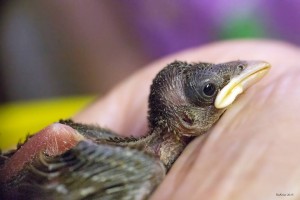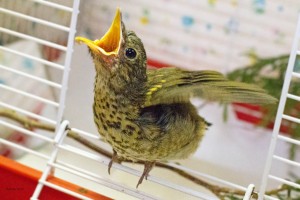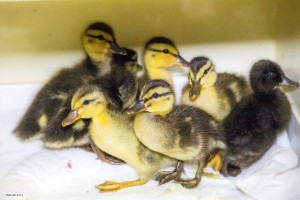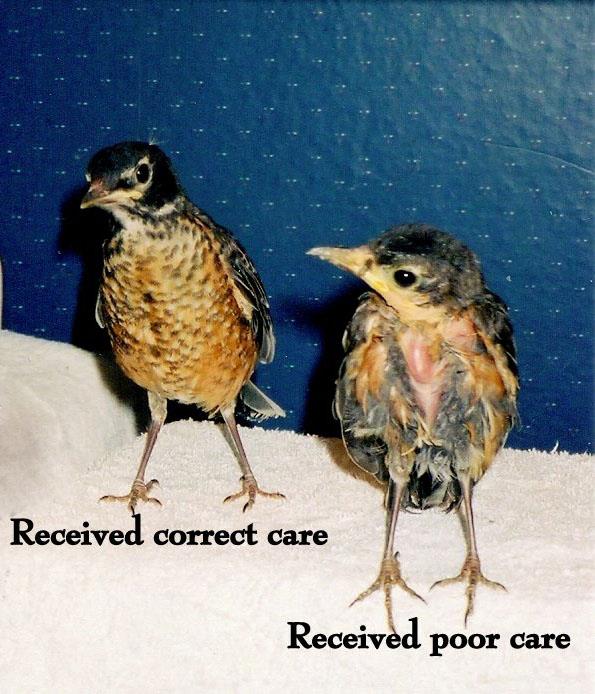Most baby birds do NOT need to be rescued. Lack of information causes people to, in essence, “kidnap” the babies, which greatly reduces their chance of survival.
Nestlings
 Nestlings are birds born naked, with eyes closed, and covered with down or pinfeathers.
Nestlings are birds born naked, with eyes closed, and covered with down or pinfeathers.
If the nestling is uninjured: If the nestling has just fallen out of the nest and is warm, put it back into the nest. The mother will NOT reject the baby because of human handling. The nestling needs to be fed frequently, so replace it in its nest quickly. If the baby is cold, it will have to be taken to the nearest Wildlife Rehabilitation Centre for care.
If you can’t find the nest: This is probable since birds hide their nests for protection. Put the nestling in a box lined with soft cloth and take it to the nearest Wildlife Rehabilitation Centre for care.
If you find a fallen nest with young birds in it: Wire it back up in a tree at the location where the nest was found. Make sure the nest is well protected from rain or too much sun. Make sure it is high enough up the tree. If the nest is broken, put it in a plastic container (a margarine container or similar) just large enough to hold the nest. Put holes in the bottom of the container for drainage and securely wire it back to the tree with the nest and nestlings in it. The parents will probably continue to care for the birds. Watch from a window or from a considerable distance. If the parents do not return within a few hours, contact your nearest Wildlife Rehabilitation Centre.
If the nestling is injured: Take to the nearest wildlife Rehabilitation Centre as soon as possible.
Fledglings
 Fledglings are fully feathered but unable to fly.
Fledglings are fully feathered but unable to fly.
Young birds learn how to forage after they learn to fly. They are dependent on their parents for about two weeks after their first flight. This is a critical time in their lives when they are subject to many dangers. It is, however, natural for them to be out facing risks and developing their skills. Their parents are still feeding them, warning them of danger and demonstrating how to behave in their quest for independence.
If the bird is uninjured: Put the fledgling bird back where it was found, unless there are cats or dogs close by. Hide it in a bush or surrounding vegetation. The baby is much better off left in it’s natural habitat and the parent birds will be near at hand. Keep dogs, cats and children away from the area so that the baby can be reunited with its parent.
If the bird is injured: Contact your nearest Wildlife Rehabilitation centre.
 Quails, pheasants, ducklings and goslings hatch fully-feathered with their eyes open. They leave the nest to follow their parents within hours of hatching. They learn to forage within three to four days. They rely on their parents for warmth, guidance, supervision and protection from predators. If separated from their parents, it is not likely that they will survive. If you cannot find the parent bird, keep the youngster warm and call your nearest Wildlife Rehabilitation centre immediately.
Quails, pheasants, ducklings and goslings hatch fully-feathered with their eyes open. They leave the nest to follow their parents within hours of hatching. They learn to forage within three to four days. They rely on their parents for warmth, guidance, supervision and protection from predators. If separated from their parents, it is not likely that they will survive. If you cannot find the parent bird, keep the youngster warm and call your nearest Wildlife Rehabilitation centre immediately.
Do not attempt to feed or give water to a nestling or fledgling bird. These birds require a specialised diet. Food or water given incorrectly to a young bird may kill it.
THIS is the difference that professional rehabilitation can make. The robin on the right was “raised” by a member of the public, fed improper food, feathers damaged from soiling, and was severely malnourished. The bird died soon after being brought into care.

